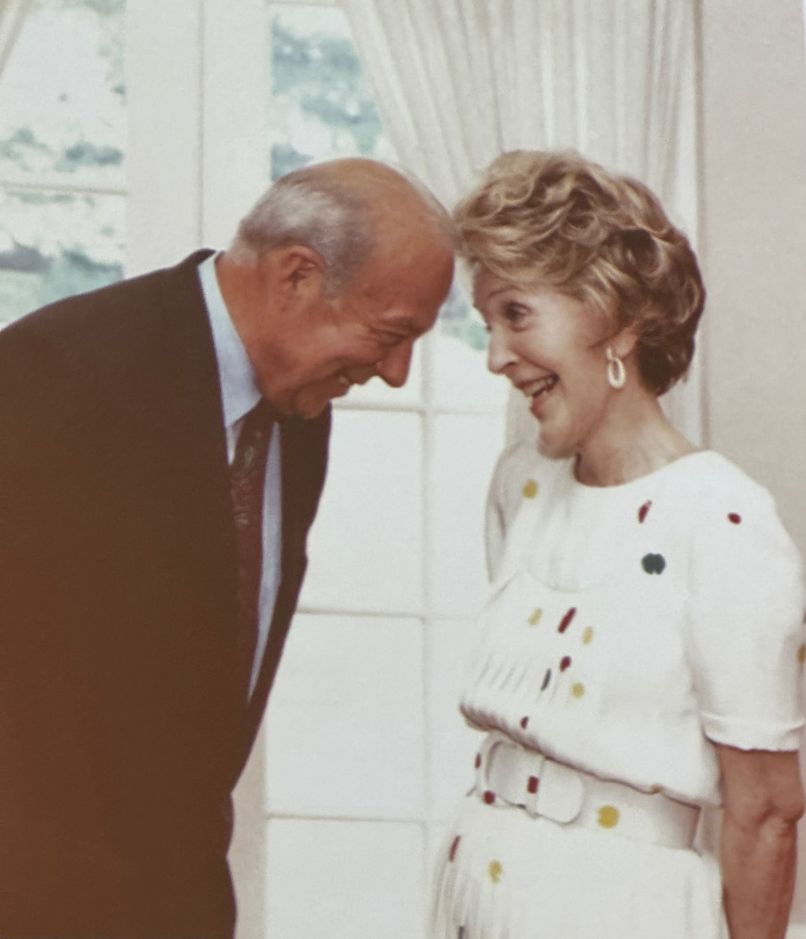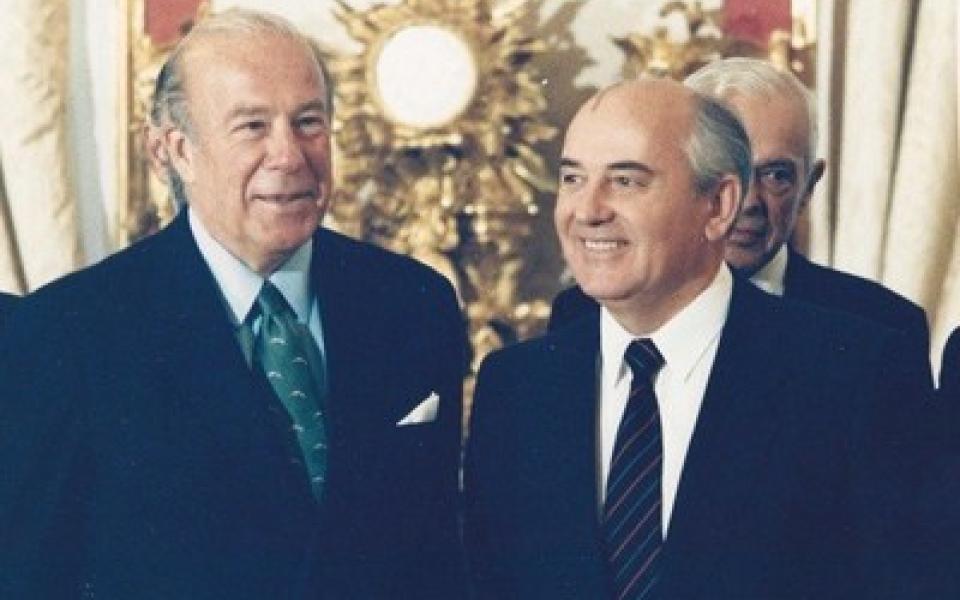Those who have any interest in US foreign policy during the last 50 years know the name George Shultz, a towering figure in diplomacy in the Reagan years. Like his counterpart in the Nixon and Ford years, Henry Kissinger, he also lived to see his 100th birthday. Perhaps someday a dual biography of these amazing centenarian diplomats will be written.
In the meantime, we have a superb book from 2023 (two years after the death of Shultz), written by a former New York Times reporter and editor. Philip Taubman, who spoke at the LBJ School of Public Affairs in Austin last month, is currently a lecturer at Stanford University’s Center for International Security and Cooperation.
ASTONISHING AND AUDACIOUS
Opening his talk, Taubman told a story that was not revealed until after he wrote the book. The time is 1982, the height of the Cold War, and Schulz has just been appointed Secretary of State by Pres. Reagan. “Not long after gets to Washington, Shultz goes to a dinner party at the home of Caspar Graham, the publisher of the Washington Post. At that dinner, Bob Woodward happened to be seated next to Opie Shultz (George’s wife). He turns to her, and asks ‘what is your husband hoping to accomplish as Secretary of State?’ Without missing a beat, she says to Bob ‘End the Cold War,’ which was an astonishing, audacious statement to make at that point.”
For those who don’t remember, Russia’s President Mikhail Gorbachev (pictured here, at right, with Shultz) later reflected on Shultz: “Without Reagan, the Cold War would not have ended. But without Shultz, Reagan would not have ended the Cold War.”
SECRETARY OF LABOR
Shultz first entered Washington as the Secretary of Labor under Pres. Nixon. But he faced immediate opposition when none of his job picks were Republicans. “What the Hell are you doing George?” exclaimed an irate White House official. “How can you appoint a bunch of Democrats in the Administration?” and he responded “I don’t care whether they’re Republican or Democrat or independent. I’m picking the best people for the job.”
SECRETARY OF STATE
While Sec. of State, Shultz “would carve out half an hour a day to retreat into the little private study of the Secretary, and he would tell his assistant: the only persons who you may put through a phone call from is the President and Opie. He used that half hour to think about what he was doing. I asked him about this, what was the point of it? He said ‘To keep the big picture in mind. I had to keep an eye on what I was trying to accomplish and not just every decision that was coming to me everyday.’”
DEPICTIONS OF REAGAN
Taubman spoke briefly about the Strategic Defense Initiative (SDI), which became popularly known as Star Wars. It was a project to erect a defensive shield over North America, to prevent any Soviet ballistic missile from reaching its target. The idea was to use a space laser to shoot them down; even though it was essentially a bluff, as the technology did not exist, Reagan insisted on it. Shultz opposed the idea, but eventually supported it. In 1986 Reagan and Gorbachev got together for a meeting in Iceland. “They came within a hair of agreeing to eliminate nuclear weapons. The whole thing collapsed because Reagan didn’t want to agree with the Gorbachev proposal on how to deal with SDI.”
Taubman mentioned a recent book by Dr. Inboden (my report on this can be read at the link below). “As you read his book and my book you will see two very different depictions of Reagan. In his view, Reagan came to Washington knowing exactly what he wanted to do and executed on it: he wanted to end the Cold War. In my view, he may have come to Washington with that idea in mind, but he had no idea how to execute the negotiation part of the formula. It wasn’t until Shultz became Sec. of State that he was able to do that.”
He points to the blizzard of 1983 as a turning point. It was February in Wash DC. “The Reagans can’t get up to Camp David for the weekend so instead they invite the Shultz’s to the White House for a private dinner. The invitation was a very deliberate effort on the part of Nancy Reagan to put her husband together with the man she believed had his best interests at heart in ending the Cold War. It was that dinner that George and Ronald Reagan for the first time really understood that they were on the same page.”
ENDING THE COLD WAR
Shultz’s executive assistant kept a secret diary, Taubman told the audience in Austin. It covered nearly the entire first three years as his time as Sec of State. “It is an 800-page document, single-spaced, which I had exclusive access to for this book. The diary to me is the unvarnished story of how Shultz was blocked over and over again in his efforts to engage Reagan in discussions about how to wind down the Cold War. The diary is full of descriptions of George coming back to the office ready to pull out his hair after he had been to the White House, out of frustration. ‘I thought I was going to meet with the President, but the room was filled with the President, the Sec. of Defense, the CIA Director and the National Security Advisor: all of whom did not want to wind down the Cold War.’” Taubman wondered out loud if Inboden would still maintain what he wrote in light of this diary.
“The thing that signalled to me that the Cold War was about to end was when Gorbachev came to Washington in 1987. Tens of thousands came out to cheer him as the motorcade went by. It was like John Glenn after his trip into space. Gorbachev was a hero to Americans at that time. It was the most amazing thing to see.”
The book, which is 456 pages, goes into great detail on all this and more, tracing the entire life of Shultz over his century from 1920 to 2021. It includes 50 B&W photos on plates; Notes, Bibliography and Index are extensive, running 67 pages.
An important corrective to the Inboden book (The Peacemaker: Ronald Reagan), this is a must-read for anyone interested in Pres. Reagan and how the Cold War really ended.
In The Nation’s Service: The Life and Times of George P. Shultz, is by Stanford University Press. It lists for $20.
Lead Photo Credit: Ronald Reagan Presidential Library/ George P Shultz Collections, Hoover Archives (Shultz/Gorbachev/Moscow/10/23/1987)

Nancy Reagan saw eye-to-eye with Shultz in their desire to end the Cold War.
